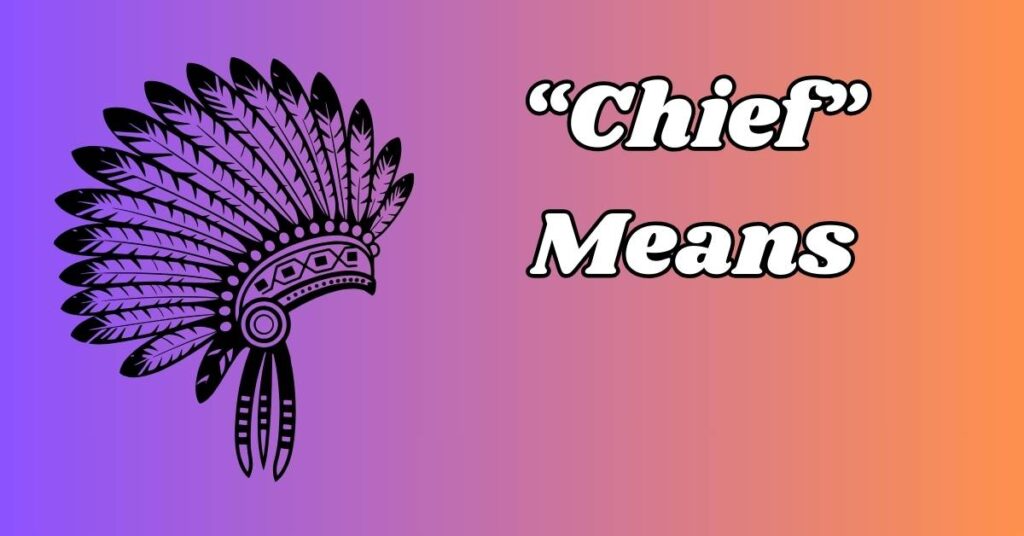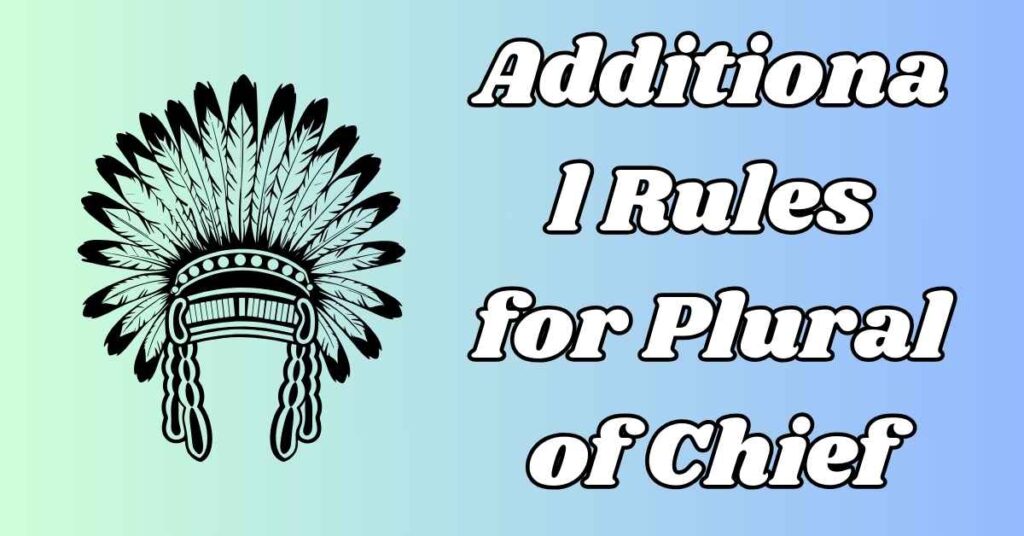Plural of Chief can often confuse many people, especially when it comes to understanding its correct usage. While some may mistakenly think the plural form is “chieves,” the truth is that the proper term is “chiefs.”
This article will explore the meaning of “chief,” its singular and plural forms, and delve into the origins of the word. Additionally, we will address common misconceptions surrounding its pluralization and provide examples to illustrate its use in various contexts.
By clarifying these points, you will gain a better understanding of how to use “chief” and “chiefs” correctly in your writing and conversations.
What Does “Chief” Mean?

The term chief refers to a leader or head of a group, organization, or community. It can describe someone in charge, such as a chief executive officer (CEO) in a company or a military chief leading troops.
The word carries a sense of authority and responsibility. In many cultures, the title signifies respect and leadership. For example, in Native American tribes, chiefs play crucial roles in decision-making and governance.
What is the Singular of Chief?
The singular form of chief is simply “chief.” When you talk about one leader, you use this term. For instance, you might say, “The chief of the department made an important announcement.”
This sentence highlights the role of one person in charge. In everyday conversation, using “chief” correctly helps convey your message clearly.
What Is the Plural of Chief?
The plural of chief is “chiefs.” This means when you refer to more than one leader, you say “chiefs.” For example, “The chiefs of various departments met to discuss new policies.” This usage shows that multiple leaders are involved in the discussion. Understanding this simple rule makes it easier to communicate effectively.
Origin of “Chief”
The word “chief” originates from the Old French term chef, which itself comes from the Latin word caput, meaning “head.” First recorded in Middle English between 1250 and 1300, “chief” was used by European settlers to describe the leaders of Indigenous nations during the colonization of North America.
While Indigenous peoples have their own specific terms for their leaders, such as sachem and ha’wiih, “chief” remains a common reference for Indigenous leaders, particularly in public discussions. Additionally, related terms like commander-in-chief and tribal chief emphasize the leadership aspect of the word.
Why the Plural of “Chief” is “Chiefs” not “Chieves”?

Many people mistakenly think that the plural form could be “chieves.” However, according to standard English plural rules, when forming plurals for most nouns ending in a consonant, you simply add -s. So, “chief” becomes “chiefs.”
The confusion often arises from how other words change their endings. For instance, some words change dramatically in their plural forms, like “leaf” to “leaves.” But with “chief,” it follows the straightforward rule: just add -s.
Chief Usage
In various contexts, chief is used frequently. In business settings, you might encounter titles like Chief Financial Officer (CFO) or Chief Technology Officer (CTO). These roles emphasize leadership and expertise within specific areas.
In military contexts, terms like military chiefs refer to high-ranking officials responsible for strategic decisions. Understanding how to use “chief” appropriately enhances communication in professional environments.
Singular Usage in Sentence
When using the singular form in a sentence, you might say, “The chief was praised for his leadership during the crisis.” This sentence clearly identifies one leader and highlights their role.
Plural Usage in Sentence
For plural usage, consider this example: “The chiefs gathered at the conference to share their insights.” Here, multiple leaders come together, showcasing collaboration among them.
Synonyms for the Word “Chief”
Here are synonyms for the word “chief”:
- Leader
- Head
- Boss
- Director
- Commander
- Principal
- Captain
- Supervisor
- Manager
- Executive
Why Is There Confusion over the Plural of Chief?
Confusion often arises from how different words form their plurals in English. Some nouns change completely while others simply add -s or -es. For example, while we say “child” for one and “children” for many, we say “chief” and “chiefs.” This inconsistency can lead to misunderstandings about how to pluralize certain words correctly.
Why “Chieves” is Incorrect
Using “chieves” as a plural form is incorrect because it does not follow standard English grammar rules for pluralization. The addition of -s is straightforward and universally accepted for most nouns ending with consonants. Therefore, sticking with “chiefs” ensures clarity and correctness in your writing and speech.
Plural of Chief in Different Contexts

Chiefs appear across various professional fields. In corporate environments, you might encounter phrases like “the chiefs met to discuss strategy.” In military communications, one might say “the generals are all chiefs.” Each context emphasizes leadership roles but may differ based on industry standards.
Scenario: Email about Military Chiefs
Imagine writing an email regarding military operations: “Dear Team, I want to acknowledge our military chiefs who have shown exceptional leadership during recent missions.” This sentence uses “chiefs” correctly while honoring multiple leaders.
Scenario: Email about Department Chiefs
In a corporate setting: “Hello Team, our department chiefs will present their quarterly reports next week.” Again, this showcases proper usage while addressing several leaders within an organization.
You May also Like: Customer’s or Customers’: What’s the Difference?
Additional Rules for Plural of Chief

When dealing with English grammar rules for plurals, remember that most nouns simply require adding s at the end. However, some exceptions exist based on spelling changes or irregular forms. It’s essential to familiarize yourself with these rules to avoid common mistakes when speaking or writing.
People Also Ask
Which is correct, chiefs or chieves?
The correct plural form is “chiefs“; “chieves” is not a standard English word.
What is the meaning of chieves?
“Chieves” has no recognized meaning in English and is often a mistaken form of the plural of “chief.”
What is the plural of chief and belief?
The plural of “chief” is “chiefs,” while the plural of “belief” is “beliefs.”
What is the correct plural?
The correct plural for “chief” is “chiefs,” following standard English pluralization rules.
Conclusion
Understanding the plural of chief is essential for clear communication. The correct plural form is “chiefs,” not “chieves,” and knowing this helps avoid common mistakes in both writing and speech. By exploring the meaning, origin, and usage of “chief,” we’ve highlighted its significance in various contexts, from corporate environments to military settings.
Mastering the proper use of “chief” and “chiefs” enhances your language skills and ensures you convey authority and clarity when discussing leadership roles. Embrace this knowledge to communicate effectively.
Related Post: Witness’ or Witness’s: Which One is Correct?

